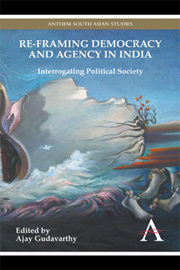Book contents
- Frontmatter
- Contents
- Preface and Acknowledgements
- List of Tables
- Chapter 1 Introduction: Why Interrogate Political Society?
- Part I Political Society and Protest Politics
- Chapter 2 Political Society in a Capitalist World
- Chapter 3 Antinomies of Political Society – Implications of Uncivil Development
- Chapter 4 Civil Society and the Urban Poor
- Chapter 5 Contentious Politics and Civil Society in Varanasi
- Chapter 6 The Politics of a Political Society
- Part II Political Society, Middlemen and Mobility
- Part III Civil Society and/or Political Society
- Part IV Rejoinder
- List of Contributors
Chapter 6 - The Politics of a Political Society
from Part I - Political Society and Protest Politics
Published online by Cambridge University Press: 05 June 2012
- Frontmatter
- Contents
- Preface and Acknowledgements
- List of Tables
- Chapter 1 Introduction: Why Interrogate Political Society?
- Part I Political Society and Protest Politics
- Chapter 2 Political Society in a Capitalist World
- Chapter 3 Antinomies of Political Society – Implications of Uncivil Development
- Chapter 4 Civil Society and the Urban Poor
- Chapter 5 Contentious Politics and Civil Society in Varanasi
- Chapter 6 The Politics of a Political Society
- Part II Political Society, Middlemen and Mobility
- Part III Civil Society and/or Political Society
- Part IV Rejoinder
- List of Contributors
Summary
A Klee painting named ‘Angelus Novos’ shows an angel looking as though he is about to move away from something he is fixedly contemplating. His eyes are staring, his mouth is open, his wings are spread. This is how one pictures the angel of history. His face is turned toward the past. Where we perceive a chain of events, he sees one single catastrophe, which keeps piling wreckage upon wreckage and hurls it in front of his feet. The angel would like to stay, awaken the dead, and make whole what has been smashed. But a storm is blowing from Paradise; it has got caught in his wings with such violence that the angel can no longer close them. This storm irresistibly propels him into the future to which his back is turned, while the pile of debris before him grows skyward. This storm is what we call progress.
—Walter Benjamin, ‘Theses on the Philosophy of History’ (1940) in Illuminations (1999, 249)Walter Benjamin wrote of history, whose face is turned toward the past and the storm from the heaven propels him forward. Politics also carries much the same imagery, at least in the way I am invoking the word here – by politics I am meaning politics of a political society. In the sense that I am invoking here, politics means some daily transactions of power, some actions on the past, yet it carries a sense of ‘making’ that is to say making future, new society, new politics.
- Type
- Chapter
- Information
- Re-framing Democracy and Agency in IndiaInterrogating Political Society, pp. 125 - 152Publisher: Anthem PressPrint publication year: 2012



